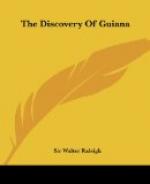This Martinez was he that christened the city of Manoa by the name of El Dorado, and, as Berreo informed me, upon this occasion, those Guianians, and also the borderers, and all other in that tract which I have seen, are marvellous great drunkards; in which vice I think no nation can compare with them; and at the times of their solemn feasts, when the emperor carouseth with his captains, tributaries, and governors, the manner is thus. All those that pledge him are first stripped naked and their bodies anointed all over with a kind of white balsamum (by them called curca), of which there is great plenty, and yet very dear amongst them, and it is of all other the most precious, whereof we have had good experience. When they are anointed all over, certain servants of the emperor, having prepared gold made into fine powder, blow it through hollow canes upon their naked bodies, until they be all shining from the foot to the head; and in this sort they sit drinking by twenties and hundreds, and continue in drunkenness sometimes six or seven days together. The same is also confirmed by a letter written into Spain which was intercepted, which Master Robert Dudley told me he had seen. Upon this sight, and for the abundance of gold which he saw in the city, the images of gold in their temples, the plates, armours, and shields of gold which they use in the wars, he called it El Dorado.
After the death of Ordas and Martinez, and after Orellana, who was employed by Gonzalo Pizarro, one Pedro de Orsua, a knight of Navarre, attempted Guiana, taking his way into Peru, and built his brigandines upon a river called Oia, which riseth to the southward of Quito, and is very great. This river falleth into Amazons, by which Orsua with his companies descended, and came out of that province which is called Motilones ("friars”—Indians so named from their cropped heads); and it seemeth to me that this empire is reserved for her Majesty and the English nation, by reason of the hard success which all these and other Spaniards found in attempting the same, whereof I will speak briefly, though impertinent in some sort to my purpose. This Pedro de Orsua had among his




